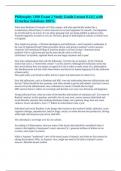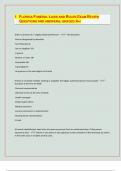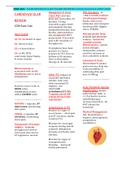Philosophy 1100 Exam 2 Study Guide Lesson 8-14 || with
Errorless Solutions 100%.
What does Bentham's Principle of Utility require, and what specifically makes this a
revolutionary ethical theory? correct answers it's not just happiness for oneself—but happiness
for all affected by an action. It's not about pleasing God, nor being faithful to abstract rules.
Promote happiness as much as we can. He lead a group of philosophical radicals to reform laws
in England.
How might two groups—Christian theologians and utilitarians—each respond to euthanasia in
the case of Sigmund Freud? What principles inform each group's position? correct answers
christians:"the intentional killing of innocent people is always wrong"--dominant moral
tradition--life is a gift from god and he must decide when it will end.
Utilitarians:"acceptable, sigmund freud was not happy anymore and in pain"
How does utilitarianism deal with the following: 1) God's role in morality; 2) the Christian
notion that God is a "benevolent creator"? correct answers Although the utilitarians stress that
their moral theory does not require an appeal to God in order to make sense of it, philosophers
like Bentham point out that God's benevolence and desire for human happiness fits the utilitarian
scheme nicely.
Does god really want freud to suffer and be in pain? not benevolent in reality if so.
How did utilitarians, such as Bentham and Mill, view the relationship between utilitarianism and
the law? What should the law promote, and when should it govern individuals' activities? correct
answers If on the utilitarianism view, euthanasia is moral, it should then be legal.
Mill: prevent harm to others, be sovereign and absolute over your own decisions and happiness
Along utilitarian lines, what are some of the benefits and burdens of marijuana use? List some of
Rachels' answers to this question, and add a few of your own. correct answers Individual and
social Benefits: pleasure that smoking marijuana brings, not a gateway drug, does not cause
violence. Fewer alcoholics. Save 7.7 billion in enforcement costs a year
Individual and social Burdens: is the danger that it poses to the smoker's health, addiction, cause
cognitive damage, unproductive, bad for lungs. society as whole become less productive, driving
while high, and taxpayers pay heavy med bills.
The individual is sovereign over his own affairs.
According to Utilitarianism, what are some of the factors that should be considered when it
comes to the legality of marijuana? correct answers (5) + generate millions of dollars in tax
revenue, more space in prisons
What is Aquinas' "traditional" view of the moral status of animals, and what are his reasons for
taking this position? Why, in Aquinas' view, might one need to be kind to animals? correct
answers -Benefits human welfare
,-believes they have no moral standing
-meant for food, skins, etc
What specific features does Bentham consider as possible differences between humans and
animals? How does Bentham respond to each of these possibilities? correct answers -The ability
to suffer
-Do not have same intelligence
-Feel pain and pleasure
Treat animals morally right, does not mean you have to treat them as equal.
Considering the principles of utilitarianism (as well as Rachels' commentary), how might a
utilitarian respond to the practices of eating meat and meat production? What conditions might
justify or condemn such practices, and why? correct answers Either become vegetarian or try to
enforce slaughterhouses to stop torturing the animals before they are killed.
The science experiments are sinful. Animals feel pain!!!
According to Mill, what does the Greatest Happiness Principle hold? How are happiness and
unhappiness to be interpreted in this context? correct answers actions are right in proportion as
the tend to promote happiness and not promoting unhappiness.
Happiness--> intended pleasure and absence of pain
Unhappiness-->pain and privation of pleasure.
How does Mill distinguish between pleasures in each of the following ways: 1) the quality of
pleasures; and 2) the desirability of pleasures? What two kinds of pleasure does Mill identify?
correct answers Quality: how well the pleasure was
Desirable: preference
Higher pleasures: mental pleasures like solving a puzzle, reading a good book
Lower pleasures: physical; sex, food, drugs,
Why, according to Mill, is it better to be a human being than a pig—in terms of the kinds of
pleasures/pains available to each? correct answers Humans, Mill thinks, are capable of both
higher and lower kinds of pleasure, while pigs (and other animals) can only experience the lower
pleasures. Even if a person is unhappy, they are better off (Mill claims) as a human with the
ability to experience higher pleasures than as a pig that can only experience the lower pleasures.
What is the ultimate end, according to the Greatest Happiness Principle? correct answers
According to Mill, the ultimate end of utilitarianism is an existence as free of pain as possible
and as rich as possible in enjoyments,
This means that one must separate oneself from one's biases and look favorably on the interests
of others.
What is the utilitarian's standard of right conduct? Whose happiness is to be considered? What is
the role of impartiality when deciding whose happiness should be favored? correct answers
, What, in Singer's view, is the main ethical question raised by the story of Dora? correct answers
In the end, what is the ethical distinction between a Brazilian who sells a homeless child to organ
pedlers and an American who already has a TV and upgrades to a better one--knowing that the
money could be donated to an organization that would use it to see the lives of kids in need?
Dora doesn't have a TV but wants one.
What happens in the story of Bob and the Bugatti, and how does Singer relate this to the issue of
children threatened by easily preventable diseases? correct answers Bob saw a child on the train
tracks when a train was about to come and kill the child. Bob parked his Bugatti by the tracks
and debating if he should save the kid or his car that would have been struck by the train too.
We all have opportunities to to save lives of children and donate money to UNICEF. Childrens
lives are no more important than adults but since they don't bring poverty among themselves we
have a duty to help.
How might Singer respond, using his own discussions as guides, to the following common
objections to helping poor children?
"I don't have any kind of personal relationship with those children, so I do not need to help them.
They're not my responsibility."
"I'm not sure that the money I give will actually make it to those children."
"I shouldn't have to help them, since no one else in my situation is helping them."
"If I help these children in this case, I'll have to help them in every case. I'm not going to give
everything I have to the point that I have nothing!"
"It is human nature that people won't make these kinds of altruistic sacrifices. This moral code
requires too much!" correct answers "Im saying that you shouldn't buy that new car, take that
cruise, redecorate the house, or get that pricey new suit. after all, a $1000 suit could save five
children lives." Basically saying no one with a surplus of money will change the conclusion of
poverty unless they stop their ways.
LESSON 10 correct answers
Summarize the three basic propositions of Classical Utilitarianism by doing each of the
following: 1) give a short word or two to summarize the subject of each proposition; and 2) note
what each proposition says about that subject. correct answers a) actions are to be judged right or
wrong solely by virtue of their consequences; nothing else matters
b) in assessing consequences, the only thing that matters is the amount of happiness or
unhappiness that is created; everything else is irrelevant
c) Each person's happiness counts the same.
How does the utilitarian distinguish—and relate—"right" and "good"? Define each, according to
Utilitarianism. correct answers Happiness is good; and actions that increase happiness are right.







